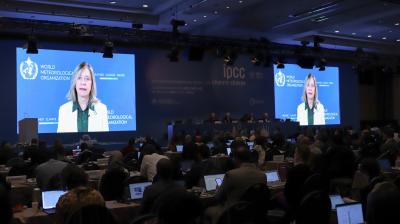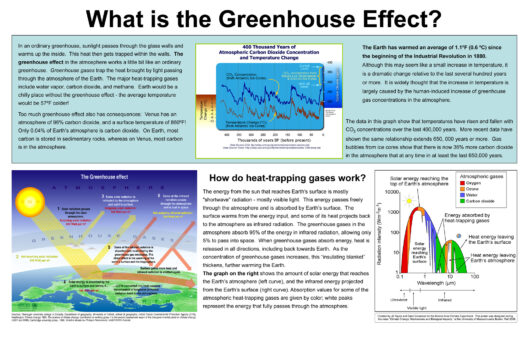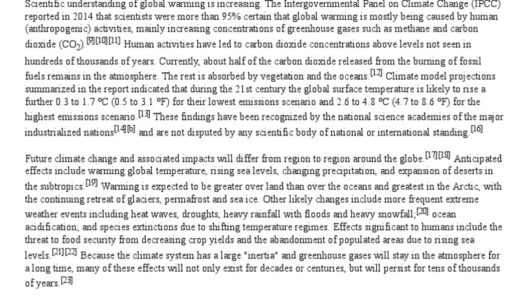Understanding the Intergovernmental Panel on Climate Change (IPCC) is crucial for grasping the global narrative on climate change. Established in 1988 by the World Meteorological Organization (WMO) and the United Nations Environment Programme (UNEP), the IPCC serves as an international body tasked with assessing scientific information related to climate change. Its remarkable composition consists of thousands of scientists and experts from different countries who contribute voluntarily to the organization’s work. This dedication to collaboration has rendered the IPCC a pivotal player in the discourse surrounding climate change, enabling it to provide comprehensive assessments that inform policymakers worldwide.
With climate change being one of the most pressing challenges of our time, understanding the intricacies of the IPCC is paramount. Climate change is not merely a scientific issue; it intertwines with economic, social, and ethical dimensions, prompting an essential exploration of how the IPCC shapes our response to this global crisis.
Addressing the science of climate change is one of the central functions of the IPCC. It synthesizes a vast array of research compiled from numerous studies, ensuring that the scientific findings presented are credible and authoritative. Such rigorous assessments culminate in periodic reports that outline current knowledge on climate change, its impacts, and potential adaptation and mitigation strategies.
What’s fascinating about the IPCC is its unique structure, which includes three main working groups. Each group focuses on distinct areas, encompassing the physical science basis of climate change, the impacts of climate change, and strategies for mitigating it. This multifaceted approach allows the IPCC to present a holistic view of climate change, addressing not only the science but also the socio-economic ramifications and potential policy responses.
The physical science basis, as examined by the first working group, delves into the complex mechanisms driving climate change. It investigates greenhouse gas emissions, temperature fluctuations, and climate models’ predictions. This group’s findings have been instrumental in substantiating the link between human activities and climate change, providing empirical evidence that fuels urgency and action.
Equally critical is the second working group, which examines the impact of climate change on natural and human systems. This group analyzes vulnerabilities within ecosystems, agriculture, and human health, emphasizing some regions’ acute risk of extreme weather events, sea-level rise, and resource scarcity. The profundity of the IPCC reports often leads to a common observation: climate change affects everyone, yet its impacts are disproportionately felt by the most vulnerable populations. The discussion surrounding climate justice inevitably emerges from these revelations, prompting deeper reflections on ethical responsibilities.
The third working group distinctly shifts focus by exploring pathways for mitigating climate change. They analyze the effectiveness of different strategies—ranging from renewable energy adoption to legislation aimed at reducing carbon emissions. Their findings serve as a beacon of hope, illustrating feasible actions societies can take to combat climate change and shift toward sustainability. Such discourse generates a sense of urgency; it transforms knowledge into responsibility, urging not only governments but also individuals and communities to act.
The IPCC reports are influential in forming the basis for international policy frameworks, including the Paris Agreement, which strives to limit global warming to well below 2 degrees Celsius. The synthesis of scientific rigor with policy implications attracts various stakeholders, from governments to businesses, making the IPCC a linchpin in global climate governance. However, it is essential to observe how these reports often stir profound fascination and reactions from a diverse array of observers, shedding light on shared concerns regarding the future of our planet.
The intersection of science and policy encapsulated by the IPCC is also where the complexity of human behavior emerges. The psychological aspects of climate change, including denial, apathy, and motivation for action, play a pivotal role in how societies respond. The IPCC serves as a catalyst for enhancing public understanding, promoting awareness, and encouraging active engagement in climate action. It underscores a common observation: knowledge is power, but knowledge alone is insufficient. It compels societies to face the uncomfortable truths about climate change and galvanizes them into collective action.
While the scientific and policy impacts of the IPCC are profound, the organization also grapples with challenges. The constant evolution of climate science and the need for timely updates present hurdles in effectively communicating findings. Furthermore, the politicization of climate change continues to complicate efforts surrounding its acceptance and integration into international agendas. These challenges necessitate resilience and adaptability on the part of the IPCC and its collaborators.
In conclusion, the Intergovernmental Panel on Climate Change epitomizes the collaborative spirit needed to combat adversities associated with climate change. The IPCC represents a wealth of knowledge distilled from the expertise of countless researchers, who tirelessly engage in the pursuit of understanding our changing climate. By weaving together scientific analysis, policy implications, and considerations of ethical accountability, the IPCC fosters a comprehensive narrative that elucidates the imperative for coordinated action. It reflects the shared residency we have on this planet and underscores that our collective choices will shape the future—or indeed, the survival—of countless generations to come. The fascination surrounding the IPCC is not just about climate science; it is rooted in the profound implications of its findings and the shared responsibility they espouse in our quest for a sustainable future.






